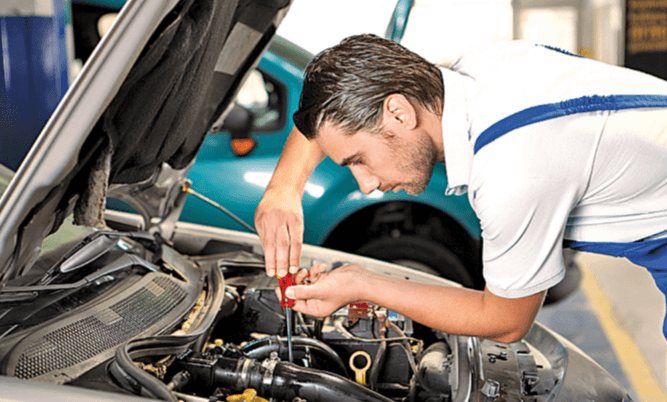The Benefits of Regular Automotive Maintenance

Maintaining a vehicle isn’t just about ensuring it runs smoothly; it’s about protecting your investment, ensuring safety, and improving performance. Regular automotive maintenance plays a crucial role in extending the life of your vehicle, enhancing its resale value, and providing peace of mind. This article delves into the myriad benefits of regular automotive maintenance, emphasizing why it’s an essential practice for every car owner.
Understanding the Importance of Regular Automotive Maintenance
Regular automotive maintenance is akin to preventive healthcare for your vehicle. Just as regular check-ups can detect and prevent health issues in their early stages, routine car maintenance can identify potential problems before they escalate into costly repairs. By adhering to a consistent maintenance schedule, you’re not only ensuring your car’s reliability but also safeguarding yourself from unexpected breakdowns.
Enhanced Vehicle Safety
One of the most compelling reasons to engage in regular automotive maintenance is safety. A well-maintained vehicle is less likely to suffer from critical failures that could lead to accidents. For instance, regular brake inspections and timely replacement of brake pads ensure your car stops efficiently, reducing the risk of collisions. Similarly, regular tire checks and rotations maintain proper traction, especially in adverse weather conditions, preventing skids and blowouts.
Moreover, routine checks of the car’s lighting system, including headlights, brake lights, and indicators, ensure that you remain visible to other drivers, further enhancing road safety. Regular maintenance of the suspension system also contributes to safer driving by ensuring that the car handles properly, especially during emergency maneuvers.
Improved Fuel Efficiency
A car that is regularly maintained tends to be more fuel-efficient. Simple tasks like changing the engine oil, replacing air filters, and ensuring proper tire pressure can have a significant impact on your car’s fuel economy. Dirty oil or a clogged air filter can force the engine to work harder, consuming more fuel in the process. Similarly, under-inflated tires increase rolling resistance, which means the engine needs to use more fuel to maintain speed.
By staying on top of these maintenance tasks, you’re not only saving money at the pump but also reducing your carbon footprint. Improved fuel efficiency is a win-win situation; it benefits your wallet and the environment.
Prolonged Vehicle Lifespan
Vehicles are a significant investment, and naturally, every car owner wants to get the most out of their purchase. Regular maintenance is key to extending the life of your vehicle. Components like the engine, transmission, and braking system are all subject to wear and tear, but regular check-ups and timely replacements can keep them functioning optimally for longer.
For example, regular oil changes ensure that the engine remains well-lubricated, reducing friction and preventing premature wear. Similarly, keeping the transmission fluid at the right level and condition ensures smooth gear shifts and prevents transmission damage. By addressing these aspects through routine maintenance, you can significantly prolong your car’s operational life.
Enhanced Resale Value
When it comes time to sell or trade in your vehicle, a well-documented maintenance history can be a major selling point. Buyers are more likely to pay a premium for a car that has been well cared for. Regular maintenance indicates that the vehicle has been reliable and is likely to continue being so for the new owner.
Moreover, cars that have been regularly maintained tend to look and feel newer for longer, which can further increase their resale value. Simple tasks like regular washing, waxing, and interior cleaning can preserve the vehicle’s aesthetics, making it more attractive to potential buyers.
Prevention of Costly Repairs
One of the most practical benefits of regular automotive maintenance is the prevention of costly repairs. Minor issues, if left unchecked, can develop into major problems that require expensive fixes. For example, a small oil leak can eventually lead to engine damage if not addressed promptly. Regular inspections allow you to catch such issues early and fix them before they become more serious.
Additionally, routine maintenance can help you avoid the inconvenience of unexpected breakdowns. By keeping all systems in check, you reduce the likelihood of your vehicle needing emergency repairs, which can be both costly and stressful.
Optimal Performance
Every car owner appreciates a vehicle that performs well. Regular maintenance ensures that your car runs as smoothly as possible. From ensuring that the engine is firing on all cylinders to keeping the suspension system in top shape, routine care helps your vehicle perform at its best.
For instance, regularly replacing spark plugs and checking the ignition system ensures that your engine starts easily and runs efficiently. Similarly, maintaining the proper alignment of your wheels not only enhances handling but also prevents uneven tire wear, which can affect driving dynamics.
Environmental Benefits
Regular automotive maintenance isn’t just good for your car; it’s good for the environment as well. A well-maintained vehicle operates more efficiently, producing fewer emissions. For example, a properly tuned engine burns fuel more cleanly, reducing the amount of harmful pollutants released into the atmosphere.
Regular checks on the exhaust system can also prevent harmful emissions from escaping into the environment. Moreover, maintaining the vehicle’s air conditioning system ensures that refrigerants, which can be potent greenhouse gases, are not leaking.
Greater Reliability
One of the key benefits of regular maintenance is the increased reliability of your vehicle. A car that is consistently maintained is far less likely to suffer from unexpected failures. Whether it’s for daily commuting or long road trips, you can count on your vehicle to get you to your destination without incident.
Regular maintenance tasks such as battery checks, fluid level inspections, and belt replacements ensure that all components are in good working order. This reliability translates to peace of mind, knowing that your vehicle won’t let you down when you need it most.
Improved Driving Experience
A car that is well-maintained not only performs better but also provides a more enjoyable driving experience. Whether it’s the smooth handling from properly aligned wheels or the quiet operation of a well-lubricated engine, regular maintenance can make driving more pleasurable.
Furthermore, a clean interior and well-functioning climate control system can significantly enhance your comfort while driving. By taking care of both the mechanical and aesthetic aspects of your vehicle, regular maintenance ensures that every drive is a pleasant one.
Compliance with Warranty Requirements
For newer vehicles, adhering to a regular maintenance schedule is often a requirement to keep the manufacturer’s warranty valid. Missing scheduled maintenance can void your warranty, leaving you responsible for the cost of repairs that would otherwise be covered. By keeping up with maintenance, you not only protect your vehicle but also your wallet.
Manufacturers typically outline the maintenance tasks that must be performed and the intervals at which they should be done. Sticking to this schedule ensures that your vehicle remains covered under warranty, providing financial protection in the event of a major repair.
Increased Roadworthiness
Roadworthiness is crucial for both your safety and the safety of others. Regular maintenance ensures that your vehicle meets all necessary safety standards and is fit for the road. This includes everything from tire condition and brake functionality to the effectiveness of the vehicle’s lights and signals.
In many regions, vehicles are required to pass periodic inspections to ensure roadworthiness. Regular maintenance makes it more likely that your car will pass these inspections without any issues, allowing you to drive legally and safely.
Lower Insurance Premiums
Believe it or not, regular maintenance can also have an impact on your car insurance premiums. Insurance companies often consider the condition of your vehicle when determining your premium. A well-maintained car is less likely to be involved in an accident or suffer from mechanical failures, which can translate to lower insurance costs.
Additionally, keeping your vehicle in good condition may qualify you for certain discounts. Some insurance providers offer lower rates for drivers who demonstrate responsible car ownership through regular maintenance.
Better Handling and Control
The handling and control of a vehicle are paramount to the driving experience. Regular maintenance of your vehicle’s suspension, steering, and braking systems ensures that your car responds accurately to your inputs. This is particularly important in emergency situations where split-second reactions are required.
For example, regularly checking and maintaining your power steering fluid ensures that your steering remains responsive. Similarly, maintaining the suspension system, including shock absorbers and struts, helps your vehicle absorb road imperfections, providing a smoother and more controlled ride.
Prevention of Long-Term Damage
Regular maintenance can prevent long-term damage that could significantly shorten the life of your vehicle. For instance, ignoring a minor coolant leak could lead to overheating, which can cause severe engine damage. Similarly, neglecting to replace a worn-out timing belt can result in engine failure.
By addressing these issues through regular maintenance, you not only avoid costly repairs but also prevent irreversible damage that could necessitate a complete engine overhaul or even the purchase of a new vehicle.
Confidence on the Road
Knowing that your vehicle is in top condition provides a sense of confidence when you’re on the road. Whether you’re navigating busy city streets or embarking on a long highway journey, regular maintenance ensures that your vehicle is up to the task.
This confidence comes from the knowledge that you’ve done everything possible to keep your car in good working order. Regular maintenance means you’re less likely to experience sudden breakdowns or mechanical failures, allowing you to focus on the road ahead.
Saving Money in the Long Run
While regular maintenance does involve some upfront costs, it ultimately saves you money in the long run. Preventive maintenance is typically much less expensive than major repairs or the cost of replacing a vehicle prematurely. By investing in regular care, you’re avoiding the financial burden of unexpected breakdowns and ensuring that your vehicle remains in service for as long as possible.
Additionally, well-maintained vehicles tend to be more fuel-efficient, which can result in significant savings over time. The improved resale value of a well-maintained car can also offset the costs of maintenance when it’s time to sell.
The Role of Professional Mechanics in Regular Maintenance
While some maintenance tasks can be performed by the vehicle owner, others require the expertise of a professional mechanic. Regular visits to a trusted mechanic ensure that all aspects of your vehicle are thoroughly inspected and maintained. Mechanics have the tools and knowledge to identify potential issues that might not be apparent to the average car owner.
Moreover, professional mechanics can provide valuable advice on how to keep your vehicle in optimal condition between service visits. By partnering with a skilled mechanic, you ensure that your vehicle receives the best care possible, further extending its lifespan and performance.
Customized Maintenance Schedules
Every vehicle is different, and so is every driver’s needs. A one-size-fits-all approach to maintenance isn’t always effective. By working with a professional, you can develop a customized maintenance schedule that takes into account your driving habits, the age of your vehicle, and the manufacturer’s recommendations.
This personalized approach ensures that your vehicle receives the specific care it needs, whether it’s more frequent oil changes for a high-mileage vehicle or additional inspections for a car that’s frequently used in harsh conditions.
Conclusion
Regular automotive maintenance is not just a recommendation; it’s a necessity for anyone who wants to keep their vehicle running smoothly, safely, and efficiently. The benefits are numerous, from enhanced safety and performance to increased resale value and environmental responsibility. By committing to a consistent maintenance schedule, you protect your investment, enjoy a better driving experience, and ensure that your vehicle remains reliable for years to come.





